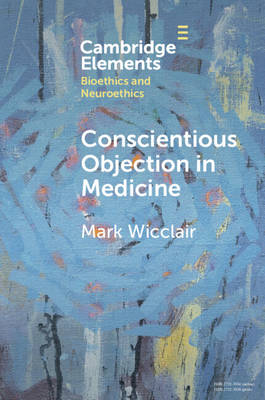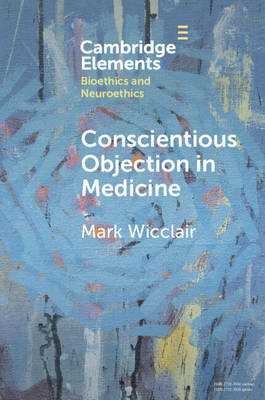
- Afhalen na 1 uur in een winkel met voorraad
- Gratis thuislevering in België vanaf € 30
- Ruim aanbod met 7 miljoen producten
- Afhalen na 1 uur in een winkel met voorraad
- Gratis thuislevering in België vanaf € 30
- Ruim aanbod met 7 miljoen producten
Zoeken
Omschrijving
The Element examines ethical and conceptual issues about conscientious objection in medicine. Concepts analyzed include conscientious objection, conscientious provision, conscience, moral complicity, and moral integrity. Several ongoing ethical controversies are identified and critically analyzed. One is a disagreement about whether conscientious objection is compatible with physicians' professional obligations. The Element argues that incompatibilists fail to offer a justifiable specification of professional obligations that supports their position. The Element also argues that a challenge for compatibilists who support a reason-giving requirement is to specify justifiable and unambiguous criteria for reviewing objectors' reasons. Arguments for and against requirements to inform and refer patients are critically analyzed, and an alternative, context-dependent requirement is offered. Another subject of controversy is about the justifiability of asymmetry between responses to conscientious objectors and conscientious providers. Typically, only the former receive accommodation. The Element critically examines arguments for asymmetry and maintains that none provides a convincing justification.
Specificaties
Betrokkenen
- Auteur(s):
- Uitgeverij:
Inhoud
- Aantal bladzijden:
- 92
- Taal:
- Engels
- Reeks:
Eigenschappen
- Productcode (EAN):
- 9781009074797
- Verschijningsdatum:
- 11/04/2024
- Uitvoering:
- Paperback
- Formaat:
- Trade paperback (VS)
- Afmetingen:
- 152 mm x 229 mm
- Gewicht:
- 136 g

Alleen bij Standaard Boekhandel
+ 63 punten op je klantenkaart van Standaard Boekhandel
Beoordelingen
We publiceren alleen reviews die voldoen aan de voorwaarden voor reviews. Bekijk onze voorwaarden voor reviews.











